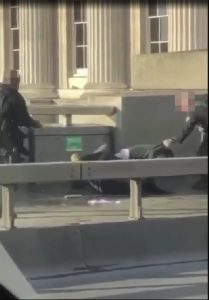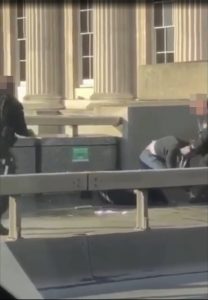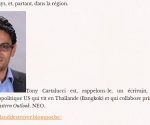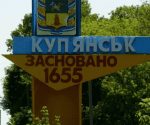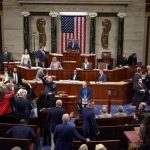The Fishmongers’ Hall terror attack inquests: the first shot
On October 16th the Old Bailey hosted a pre-inquests review hearing in the case of the deaths at the Fishmongers’ Hall “terror” incident of 2019. As such, it was thought a good idea to assemble extracts of the court transcript here ahead of full coverage when the inquests take place later in 2021.
The idea is to report some of what took place at the review hearing, and do it without comment, so that each of us can form an early impression as to what crucial information we would expect needed to be discovered at the inquests so as to properly understand how deaths occurred, and whether or not we would expect such data to actually be discovered satisfactorily, if at all.
For instance, the author is interested to know where the first shot fired by police at the supposed perpetrator hit its target. The reader might understand the interest when he peruses the images taken from (phone-camera captured?) video footage, which show the first shot being taken – evidenced by the gaseous emission from a gun muzzle emanating from outside the images on the right hand side – and the supposed perpetrator collapsing into a laying down position from a sitting up one. The sequence shown here, left to right, takes place all within a single second. (Click an image to enlarge).
[FBEL’s coverage at the time of the incident was limited to, The London Bridge incident: the City of London/British Military Intelligence amalgam at low ebb?, here].
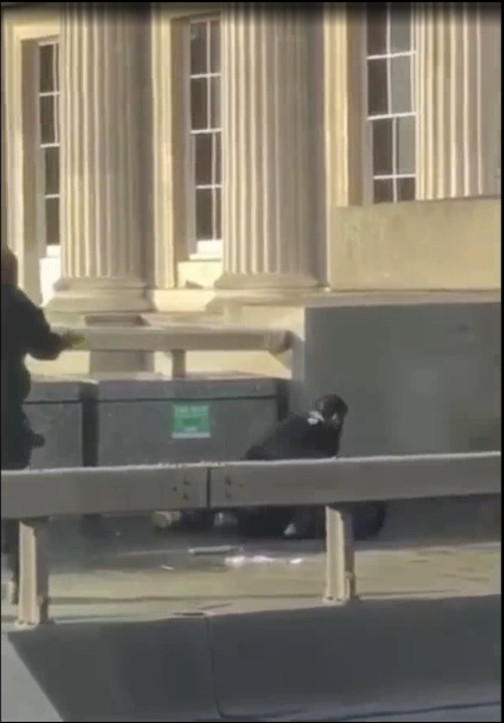 |
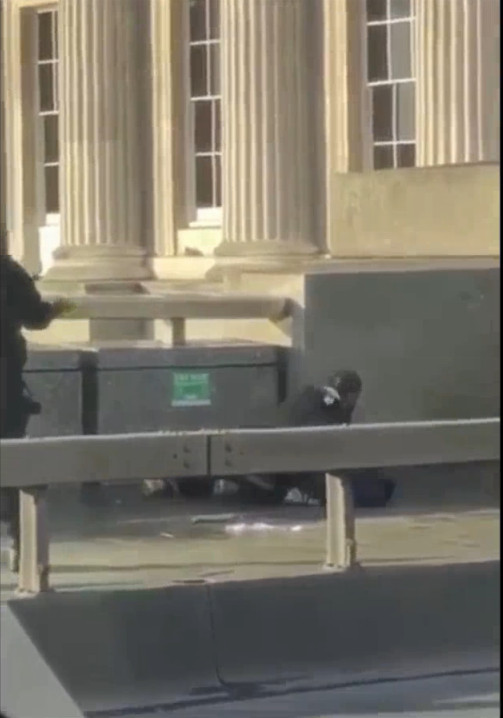 |
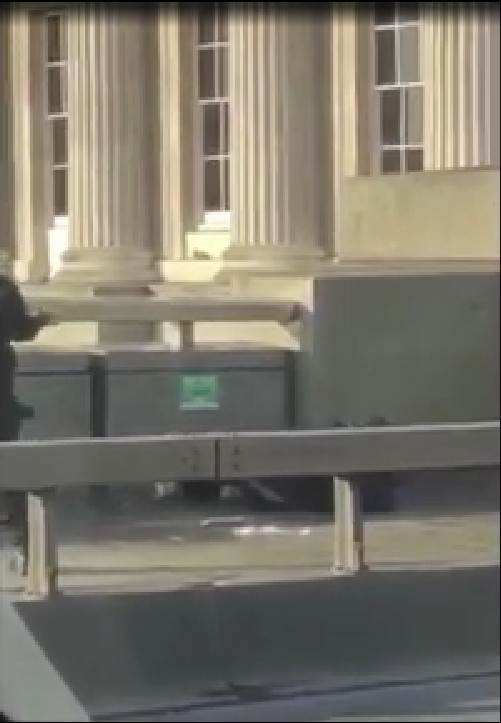 |
All of the following is direct quotation from transcript; punctuation marks, or indentations to indicate quotation are felt to be redundant, and thus are absent.
From the opening remarks by HHJ Lucraft QC, presiding:
My name is Mark Lucraft. I am the Recorder of London and the Chief Coroner of England and Wales. I am the coroner hearing the inquests into the deaths resulting from the attack at Fishmongers’ Hall and London Bridge on 29 November 2019. This inquest hearing is taking place at the Central Criminal Court, or the Old Bailey, as it is more commonly known. The events we are to examine took place in the City of London, close to this building.
An inquest is a process by which a court hears evidence so that a coroner or a coroner with a jury can make findings of fact and come to a determination about a death. Formerly, a conclusion was known as a verdict, but the word ”determination” is now used to distinguish the inquest process from a criminal trial. Despite the setting for this inquest hearing, nobody is on trial here. An inquest does not decide matters of criminal or civil liability. This inquest hearing is a way of establishing the facts of each of the deaths…
Jack Merritt and Saskia Jones were two of those attending a Learning Together event at Fishmongers’ Hall on 29 November 2019. Learning Together is a national organisation founded in 2014 and dedicated to the rehabilitation and education of prisoners. It is associated with the University of Cambridge and runs courses in a number of prisons.
The event on 29 November was to be attended by a variety of people associated with the organisation, including supporters of the organisation, current and former university students and current and former prisoners. Saskia was a former Cambridge criminology student who sometimes came to Learning Together events, and Jack a former Cambridge undergraduate, who was employed by the university to work full time for Learning Together.
Jack and Saskia were both attacked by one of the other attendees at the event: Usman Khan, a former terrorism offender. Both Jack and Saskia received stab wounds that proved to be fatal. Two others were also attacked and seriously injured: Stephanie Szczotko and Isobel Rowbotham. They survived the attacks on them.
A number of those present set upon Khan, attacking him with items of furniture, a decorative pike, narwhal tusks and a fire extinguisher. Khan confronted a maintenance engineer and threatened him, forcing him to use his fob to allow Khan out of the building.
On London Bridge, Khan was attacked by members of the public, forcing him to the floor and kicking the knives he was holding from his grip. Armed police officers were soon on the scene and directed members of the public away. Khan was wearing what appeared to be a suicide vest. He was shot and tasered.
Those attacked in Fishmongers’ Hall received first aid. This initially was from bystanders at the event and then from the emergency services. Despite all the efforts that were made, sadly both Jack and Saskia died. I will pause there and invite all present to stand, if you’re able, with me to observe a minute’s silence. (Pause) Thank you.
From the submissions by Hough:
I appear with Aaron Moss as Counsel to the Inquest, instructed by Sinéad Lester and Natasha Davis of BDB Pitmans, solicitors to the inquest…
Sir, as to the organisation of these inquests, we propose that there should be two hearings. First of all, a hearing of the inquests of Saskia Jones and Jack Merritt, which would consider the attack at Fishmongers’ Hall and the background to that attack. Secondly, immediately afterwards, a shorter hearing of the inquest of Usman Khan, which would primarily concern events on London Bridge and the confrontation in which he was killed. There will be different juries for the two hearings…
The inquest of the two victims will address different issues and have a different focus from that of the attacker. Simplifying greatly, the victims’ inquest will concentrate on how the attack at Fishmongers’ Hall took place and whether opportunities were lost to prevent it or take better security measures. The inquest for the attacker will concentrate on how he came to be shot, including the reasonableness and the lawfulness of the armed officers’ conduct.
We accept there will be some overlap in subject matter. Both hearings will receive evidence about the life and background of Usman Khan. However, it will necessarily be more extensive in the first hearing, which will consider how he was managed as an offender and monitored in the period leading up to the attack.
Some of the witnesses called in the first hearing will give evidence extending to events on the bridge. There is certainly no difficulty about that, since the second hearing will consider events on the bridge in more detail without recalling the same witnesses from the first hearing.
The second hearing will require some introductory evidence about the attack in the Hall in order to set the scene. However, that need not be lengthy or controversial, and the jury in that hearing will not be reaching conclusions about the events in the Hall…
If I then turn to item 2, the application of the Khan family for Interested Person status. Appropriate members of the Khan family have been accorded Interested Person status in the inquest of Usman Khan. The effect is that their legal team will receive full disclosure of documents and will be entitled to examine all witnesses in the inquest of Usman Khan. There will only be very few documents relating to the inquest of the victims which will not be disclosed to the Khan family, principally post−mortem reports and any medical material relevant to the victims.
The Khan family have nevertheless applied for Interested Person status in the inquests of Jack Merritt and Saskia Jones, primarily because there are witnesses in those inquests of whom they may wish to ask questions…
What we propose is a rather simple process, that Mr Bunting [for Mrs Begum, mother of Usman Khan] should attend parts of the [victim’s] hearing which are of interest to his clients. He should be given a position in the order of counsel to examine witnesses. If he wants to question a witness, he can state his interest briefly and then you can decide whether to permit him to do so†…
To address some specific points which have been made, first of all, security arrangements at Fishmongers’ Hall, it is certainly possible to say that there could have been further security measures at the Hall, additional security checks or a metal detector. However, the Fishmongers’ Company isn’t an emanation of the state and didn’t owe Convention obligations. Security systems were also the subject of structured risk assessment involving external consultants. To our knowledge, its personnel were not aware of Usman Khan’s background.
Secondly, the position of Cambridge University. On the evidence at present, we can’t see an arguable case that the university’s safeguarding procedures weren’t effective, although that will of course be kept under consideration. Nor does the present evidence provide the basis of a test that the university personnel knew or should have appreciated a real and immediate risk of a murderous attack, even if the university could have an Osman−type duty, which is itself a moot legal point.
Thirdly, warning signs from Khan. The point has been made that there were some signs that Usman Khan had spells of depression or withdrawal from the probation staff and Prevent officers who managed him as a former terrorist offender. However, in our submission, such signs on their own don’t provide the basis for an arguable case that those officers should have appreciated a real risk of him committing an attack and prevented him travelling or changed the arrangements.
Fourthly, offender management of Khan. There were on any view extensive systems in place in managing Khan in the community: significant restrictions on his movements; electronic tagging; regular meetings with probation staff, Prevent officers and mentors; oversight involving regular MAPPA meetings; and reporting. There were numerous management systems.
As to the operational duty, it wouldn’t be safe at this stage to say that there is an arguable case that those involved in managing Khan should, at a particular point in time, have appreciated the risk of an attack and taken action. Much more evidence is required to form a judgment on that.
Fifthly, monitoring Khan. Similar points can be made in relation to the monitoring of Khan by the security services following his release from prison. The inquest will receive as much relevant evidence as possible on this subject, but that evidence has yet to be prepared. It would be premature and unfair, in our submission, to say that there was an arguable deficiency in monitoring systems or that those responsible for Khan should arguably have seen a real and immediate risk of a lethal attack.
Sixthly, and finally, acceptance of Khan into the Learning Together programme. In their written submissions for this hearing, the Merritt family also submit that Khan was a prisoner who had exhibited poor behaviour before being accepted into the Learning Together programme in 2017, while he was in prison. Sir, in our submission, that may be so, but we can’t at present see that it raises an arguable case of breach by the state or agents of the state of Article 2 duties in relation to the attack he committed over two years later. [This is to do with an argument that Merritt and Jones suffered human rights abuses because of failures of the state and its agencies].
We would like to emphasise that we are not seeking to defend any individual or state agencies. The inquest may ultimately find a basis for criticising systems or decisions, as happened in both the Westminster Bridge and the London Bridge inquests. That is not saying the same that Article 2 should now be found to be engaged as a legal matter…
[To Lucraft] In pursuing the enquiries I shall mention, your team have been closely working with the Operation Bemadam team of SO15, the Metropolitan Police counter−terrorism command led by DCI Dan Brown. Nearly two weeks ago we circulated an update note to Interested Persons detailing the enquiries made on your behalf to further the enquiry and the plan for disclosure of material to Interested Persons. Let me summarise the main points for those watching and listening…
[Omitting the first four] Fifthly, we prioritised the disclosure of some of the most relevant CCTV footage of events on the bridge. Meanwhile, the SO15 team have assembled and reviewed a vast amount of footage generally: CCTV, footage from vehicles, officers’ body−worn video footage and videos recorded by the public. A series of compilations are being prepared, including of Usman Khan’s movements in the weeks before the attack, his journey to London, events on the day of the attack, movements of the two victims and first aid provided to them. We viewed preliminary drafts of the main compilations earlier this week. We should point out that while there is a lot of footage of events in the open, there is no footage of the actual attack in the hall…
By the end of November, we expect to disclose the following prisons material: segregation records, prison call monitoring records, security information reports, pro forma reviews of Khan including managing challenging behaviour reviews, documents relating to mail received by Usman Khan, prison transfer paperwork, records of sentence plan objectives and person escort record forms.
We also expect to disclose the following probation records by the end of November: approved premises documents, mentor reports, documents from the probation case management system, OASIS assessments from 2012 to 2018 and the probation case file.
That is all, of course, subject to review by the security authorities…
For the benefit of state agencies reviewing material for sensitivities, we should stress that we expect that redactions will only be proposed on one of the usual three grounds: first of all, that material is irrelevant to the inquest; secondly, that material is relevant but that all relevant content can be communicated by a specific gist; or, thirdly, that the material is relevant but subject to public interest immunity [PII], in which case an application supported by a certificate will be made in due course. It creates difficulties for the inquest team if we receive objections based on unspecified sensitivity, only to discover later that a formal PII claim would not be made…
The SO15 team of the Metropolitan Police were responsible for the criminal investigation of the attack itself. Their current view is that nobody other than Usman Khan was involved in planning or executing the attack. Separate from that investigation is a criminal investigation into other aspects of the events at Fishmongers’ Hall, including whether any offences were committed in arrangements for the event. That investigation is led by the City of London Police, and the City of London Corporation, as the health and safety enforcement authority for the area, is also involved.
There are good communications between your team and the City of London Police and the Corporation. Material gathered for the inquest can properly be used in the criminal investigation.
Nevertheless we have one particular issue to raise in this hearing. Sir, as you know, if anyone is to be prosecuted for a homicide offence in relation to a death, it is usual for that prosecution to happen before the inquest. That’s because of concerns that the inquest process should not have any adverse effect on criminal proceedings. There are provisions in schedule 1 to the Coroners and Justice Act which enable prosecuting authorities to request the suspension of an inquest pending a prosecution, as set out in paragraph 30 of our submissions.
As matters stand, there has been no request for these inquests to be suspended and no indication that such a request will be made in future…
In our submissions at paragraph 38, we’ve addressed some issues raised by the Khan family about the independence of two expert witnesses and the scope of opinion evidence to be given by firearms training witnesses. Again, I don’t propose to develop those points now, but shall respond as necessary in reply.
From the submissions by Henry Pitchers, for the Jones family:
Just briefly in relation to the facts of this matter from the evidence that has been provided and the summaries which have been given, we know that Usman Khan was a convicted terrorist. We know that he had been released from prison in late December 2018, so had been out of prison for less than a year when this attack occurred. We know, and it won’t be disputed, that he was subject to statutory MAPPA supervision. He was also supervised by the probation services, and you’ve seen from the witness statements that have already been disclosed the relatively frequent contact that they had with him. As I understand it, he was screened prior to his release by the West Midlands Police and assessed as the highest level of risk. He had 22 licence conditions attached to his release.
We say −− and these are just preliminary observations −− that, looking at the evidence that we’ve seen, his last unannounced visit, it would seem, by police officers was on 14 November 2019, so just over two weeks before the attack. They arrived at midday. They found the flat to be dark. It would seem that Mr Khan wasn’t happy about them taking photographs of his Xbox games. He said he wanted to speak to his solicitor and he asked the officers to leave, and they complied with his request.
We know also that, at the time of his attack, he lived alone, he wasn’t working, there was no mentoring being provided, the mentoring having ceased in August 2019, and what we would say is this was hardly a reassuring profile.
Yet we know as well from the evidence that has already been released that his attendance at this event was expressly authorised. It wasn’t somehow slipping between the terms or conditions that had been applied to the way that he lived; he was given express permission to attend and, on the evidence that I’ve seen, those who were involved in giving that permission did nothing further to notify the Metropolitan Police or the City of London Police, the Fishmongers’ Company who of course own the hall where the event took place, nor specifically to make contact with the organisers of Learning Together, who organised the event. As you’ve already indicated, there was no security check at the door, not even a rudimentary bag−check, no sort of metal detection by one or otherwise.
So, pulling these together, whatever further evidence comes out, the position of Saskia’s family is that there is more than sufficient material to determine an arguable breach of Article 2.
From the submissions by Mr Nick Armstrong for the Merritt family:
However, I do want to just say that the material is there, as Mr Pitchers says, and I want to add two points to what he said.
One is Mr Hough said, in response to my written submission about how did Mr Khan get past the Learning Together in 2017 when he was behaving in the way that he appears to have been behaving in 2017, the answer to the causative response that Mr Hough makes is that that process is the foundation for all that comes afterwards. If you get the risk assessment process wrong in 2017, then it is still wrong in 2019 and that’s how it works back. We are at an early stage in relation to that, but that’s the way it would work, and that’s why we say that that material is relevant.
But can I also emphasise this: as well as Article 2 in its operational aspect, you have Article 2 in its general aspect and the Convention general duties, under whether it is Article 2 or in fact, are about the establishment of high−level systems, yes, but that also embraces staff −− so you have to develop a system, but you have to staff it properly and you have to staff it with people who are trained properly. The Strasbourg court does regularly descend into quite high levels of detail about whether those obligations have been met and whether a system is appropriate in that respect.
One of the key things I want to emphasise is that in this case, already on the material that has been produced, you have all of the Prevent officers from Staffordshire, or certainly the majority of the Prevent officers from Staffordshire, saying that they had no specific training in handling terrorist offenders. So far as we can see, it was handed over by the West Midlands counter−terrorism unit to the Staffordshire unit, for reasons that remain to be explored, and all of them are saying they had no specific training.
Now, when one looks at that in the context of what we know about offending behaviour work in the context of terrorism, which is a relatively undeveloped area of thinking about defendant behaviour work, if you have all of that force or the majority of that force saying that they were not trained in something that requires specific training, then you at least arguably have a system problem. That’s why I make the position that I do, and if I’m right about that, even to the very low arguability threshold, then I say that this inquest should say so.
One of the reasons why we say that is because it might just bring about the focus that I’ve talked about elsewhere in the submissions, which is getting the work done and communicating the concern that this court may have and the interest that this court may have in those matters. That’s why I maintain that submission…
In relation to disclosure, can I just add one thing? I am very grateful to Mr Hough for setting out, which he did to me in person before the hearing started, about the timetable for disclosure and that goes a long way to meeting some of our concerns that we want to essentially speed −− with great respect, we would like to speed that process up…
It’s a big job, that area, and it’s going to take some time. I just want to sound a slight note of concern, which is this: if it’s going to be six weeks before we get that material, that’s the beginning of December, we then need to review it. You can already see from our submissions that there’s a real risk that things will be missing at that stage and it will start a train of enquiry and it will identify other documents that aren’t in that first tranche, witnesses that need to be identified. By the time we’ve done that and communicated that, realistically, I can easily see that’s going to go over Christmas until January, and if we’ve got an April start, it’s beginning to get tight.
The reason I’m flagging it at the moment is −− and this is just based on experience of how large cases like this go −− any slippage would need to be, in my submission, carefully watched by Counsel to the Inquest because slippage of that kind in that area, if we’re not starting that process essentially until December, could potentially derail. So I’m just putting up a very gentle flag, if I might, about that. That’s all I want to say about disclosure unless I can assist you further on that.
I would also, just finally, in relation to criminal investigation, I know that’s a matter for City of London Police. Can I just emphasise the points that we make? The Merritt family does gently sound a note of scepticism about whether that’s going to go anywhere. The last couple of cases with which Hickman & Rose and myself have been involved, where prosecutions of that kind have occurred, is those prosecutions have been explored, it has taken four years in both cases to explore them, only to say no at the end of that four years… So there is a genuine concern and we would encourage CoLP to look carefully at whether that is a route to… [missing]. Because we doubt it.
From the submission by Danny Simpson, for the Independent Office for Police Conduct:
The organisation is carrying out two investigations under its duty to investigate death and serious injury incidents where there has been contact with the police. It’s investigating in two discrete areas relating to the contact Mr Khan had with officers from Prevent in Staffordshire, and then with officers on London Bridge which led to his shooting. Those remain investigations under the death and serious injury jurisdiction, and whilst they could lead potentially to criminal investigations, they’re at an advanced stage and there is a formal process to go through if those investigations were to become criminal or, indeed, misconduct investigations, and that threshold has not been reached in either. I’m instructed that there is no realistic prospect that they will do so, and I say that in respect of point 7 on the submissions and paragraph 33.
From the submission by Fiona Barton, for the City of London Police:
We largely agree with what is said by Counsel to the Inquest.
Dealing with the specific item with which City of London Police are concerned, which is item 7 on the agenda, the criminal investigation and potential prosecutions, as, sir, you are already aware, the City of London Police are conducting a criminal investigation into the facts leading up to the deaths. That criminal investigation includes, but is not limited to, the direct arrangements for the Learning Together event at Fishmongers’ Hall.
The stage that the investigation has reached is that the investigation file has recently been provided to the Crown Prosecution Service by the City of London Police, and it’s routine in cases such as this that there is discussion between the investigating force and the Crown Prosecution Service concerning what offences are disclosed, if any, whether the relevant evidential tests are met or whether any further investigations are needed. The investigation, as I say, is currently at that stage and these discussions are ongoing.
Sir, I should acknowledge immediately that the City of London Police are acutely aware of the need for the decision in this case to be expedited. This is because it is acknowledged that any delay in this process risks a knock−on effect to these inquests and that is the last thing that any of us want… And we acknowledge the increased stress and distress this will cause to the bereaved families and indeed to witnesses who are having to potentially relive these tragic events. So I can say, sir, that without undermining the integrity of the decision−making process in that investigation in any way, the decision will be expedited as far as possible, and both the Crown Prosecution Service and the City of London Police are working to those ends.
† From the Direction following the pre-inquest review hearing on 16th October 2020:
The application of Mrs Parveen Begum for designation as an Interested Person in the inquests of Jack Merritt and Saskia Jones, pursuant to section 47(2)(m) of the Coroners and Justice Act 2009, is refused.
Legal representatives of the family of Usman Khan may ask appropriate questions of any members of the Khan family who give evidence in the inquests of Jack Merritt and Saskia Jones.
If the legal representatives of the family of Usman Khan wish to ask questions of any other witnesses in the inquests of Jack Merritt and Saskia Jones, they may seek permission to do so when those witnesses give evidence (or otherwise by permission of the Court).




